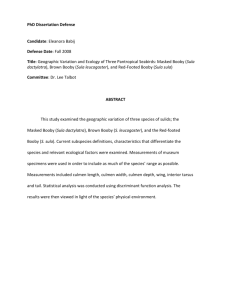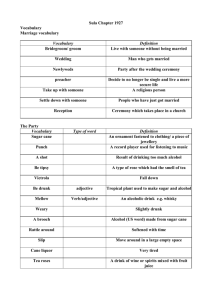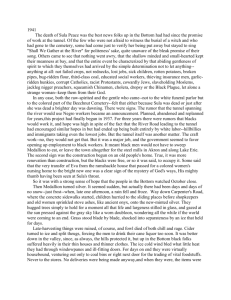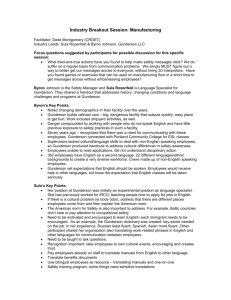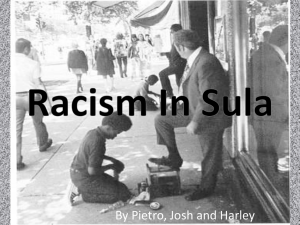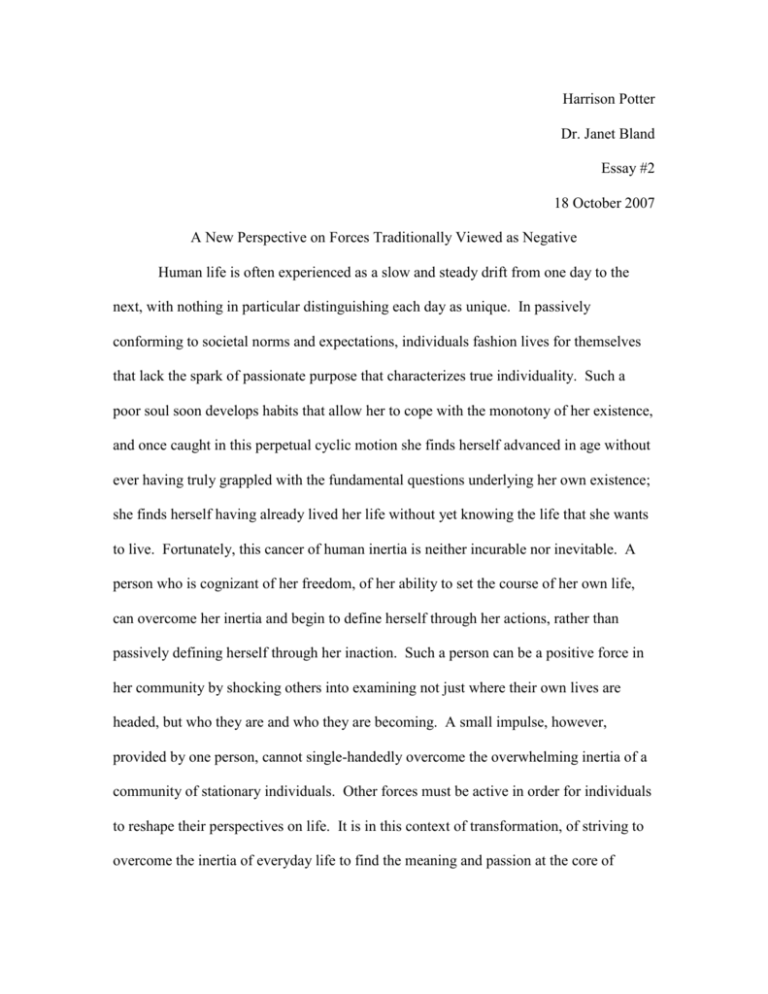
Harrison Potter
Dr. Janet Bland
Essay #2
18 October 2007
A New Perspective on Forces Traditionally Viewed as Negative
Human life is often experienced as a slow and steady drift from one day to the
next, with nothing in particular distinguishing each day as unique. In passively
conforming to societal norms and expectations, individuals fashion lives for themselves
that lack the spark of passionate purpose that characterizes true individuality. Such a
poor soul soon develops habits that allow her to cope with the monotony of her existence,
and once caught in this perpetual cyclic motion she finds herself advanced in age without
ever having truly grappled with the fundamental questions underlying her own existence;
she finds herself having already lived her life without yet knowing the life that she wants
to live. Fortunately, this cancer of human inertia is neither incurable nor inevitable. A
person who is cognizant of her freedom, of her ability to set the course of her own life,
can overcome her inertia and begin to define herself through her actions, rather than
passively defining herself through her inaction. Such a person can be a positive force in
her community by shocking others into examining not just where their own lives are
headed, but who they are and who they are becoming. A small impulse, however,
provided by one person, cannot single-handedly overcome the overwhelming inertia of a
community of stationary individuals. Other forces must be active in order for individuals
to reshape their perspectives on life. It is in this context of transformation, of striving to
overcome the inertia of everyday life to find the meaning and passion at the core of
Potter 2
existence, that sex, violence, racism, even death, and, ultimately, Sula, are appropriately
viewed as positive forces.
Nel was raised to think highly of Helene, who was a commanding presence at
church and commanded the respect and admiration of Wiley, her seafaring husband. Yet
when Nel is traveling to New Orleans with her mother on the train, she is forced to see
Helene in a completely different light, questioning those beliefs and convictions that she
had held so dear her entire young life. When Helene reacts to the conductor’s racism
with a voice in which “an eagerness to please and an apology for living met” and a large,
bright, downright obscene smile that causes the other black passengers’ blood to boil, Nel
realizes that there is more to the world and her mother than the perfectly cleanly home
and sanitized lifestyle that Helene keeps back in Medallion (20). Nel cannot stand to
look at either her disgraced mother or the disgusted black soldiers, but instead stares
“deeply at the folds of her mother’s dress…, wanting to believe in its weight, but
knowing that custard was all it hid” (22). Unable to accept this fate for herself, wanting
nothing more than to be strong; independent; dignified; truly black, Nel resolves to
“make certain that no man ever looked at her that way” (22). Racism and the way in
which it led Helene to reveal her true character and courage, or rather lack thereof,
ultimately led Nel to commit to being something more, to rising above the expectations
of a racist society that her mother was inadvertently supporting with passivity. In
providing the impetus for this personal revelation, racism acted as a positive force in
Nel’s life. Although it remained oppressive, it also prompted her to step back and
consider who she wanted to be, to establish a sense of identity and self that might
otherwise have never developed.
Potter 3
Sula embodies this spirit of rebellion and independence, even from a very young
age. When Nel and Sula were still but twelve years old, Nel was harassed by a group of
three Irish boys while walking home from school, and subsequently took a much longer
route home with Sula. Unable to stand for this injustice, however, Sula soon
demonstrated her capacity for courage by insisting that they go home along the shortest
route. When the same Irish boys came up to them, intending to harass them as before,
Sula pulled out a knife and a slate, and proceeded to slowly and willfully cut the end of
her own finger off, declaring “If I can do that to myself, what you suppose I’ll do to
you?” (55). Violence against her friend Nel prompted Sula to react violently, yet very
deliberately. Not only did violence provide the impetus for change in Sula, but it also
served as a memorable expression of the courage she had found in herself to protect her
friend; it was something she would never forget. The revolution in her character was
permanently cemented in her being by her violent act of self-mutilation.
Death is also portrayed as a natural transformative force that is ever-present in
life. Nel and Sula are playing innocently under a tree by the river when Chicken Little
comes over to play with them. After Sula and he come back down from climbing the
tree, they are in a gleeful frenzy, so Sula grabs him by the hands, swinging him around as
is common play with little children. Even as “he slipped away from her hands and sailed
away out over the water, they could still hear his bubbly laughter” (60). Unfortunately,
Chicken Little was too young to keep himself afloat and soon drowned, even while “the
pressure of his hard and tight little fingers was still in Sula’s palms” (61). Sula frantically
tried to find help, but to no avail, and both girls were forced to confront the reality not
just of death, but of sudden death experienced first-hand. After days of floating down the
Potter 4
river, the body was eventually retrieved and a closed-casket funeral was held, where the
girls, who had been uneasy in each other’s presence since the tragedy, had to reconcile
and learn to cope with the reality and inevitability of death. As they stood by the grave
following the burial, “they held hands and knew that only the coffin would lie in the
earth; the bubbly laughter and the press of fingers in the palm would stay aboveground
forever” (66). Experiencing the hard finality of death gave them cause to consider their
own lives and life itself, its meaning and purpose, and how they should live their lives in
order to best cope with the hard reality that to every beginning there must come an end.
Death is seen not as a cause for panic and sorrow, but as nature’s way of making life a
more intense experience, of bringing a certain passionate urgency into the hearts of all
those living so that life does not decay into the mundane routines that society encourages,
but rather swells in the simple and pure joy of its own existence. Even as Sula lay dying,
her final thoughts were playful in nature, pondering her own life and then finally,
realizing that she was already dead and that she had felt no pain, she smiled, declaring
“Well, I’ll be damned, it didn’t even hurt. Wait’ll I tell Nel.” as she passed on (149).
Sula realized the need for individuality and freedom, for passionate and risky
living, and she lived accordingly, trying to bring others, especially Nel, to the same
realization that life was not about doing what society expected of you. After a ten year
absence, Sula returns to speak to her mother, articulating many of her radical positions in
order to convey who she is to Eva. When Eva suggests that Sula needs to settle down
and start a family, Sula asserts that “I don’t want to make nobody else. I want to make
myself” (92). As the argument that ensues comes to a close, Eva shouts that Sula is
burning with hellfire, to which Sula screams back “Whatever’s burning in me is mine, …
Potter 5
and I’ll split this town in two and everything in it before I’ll let you put it out!” (93).
Such a powerful assertion that it is her passion, her spirit and willful bucking of societal
conventions, that defines who she is, makes it clear that Sula is an extraordinary
individual, a person with an appreciation for her free will and a mind dead-set on making
use of that freedom. Somehow this resolve seems to make Sula a more complete person,
worthy of a full name shortly after her return: “Miss Sula Mae Peace” (94). Nel notes
that Sula’s return makes every aspect of life seem more valuable, enjoyable, and playful,
praising Sula by stating that she “never competed; she simply helped others define
themselves” (95). Even as the community at large comes to view Sula as a witch, it is her
very role as troublemaker that causes everyone to take stock of their lives: each woman
cares for her children more dutifully and puts more effort into satisfying her husband
sexually so that he might not stray and have sex with Sula.
Sexual promiscuity, however, is a character trait that is viewed with great disdain
by other members of the community, including Nel. This is brought into sharp focus
when Nel cannot wrap her head around the fact that Sula would have sex with Jude. Sula
still cares deeply for Nel and views Nel as her closest friend, despite her actions, for in
explaining to Nel why Eva was put out Sula “could lie to her only because she cared
about her” (121). Nel remembers this deep bond between them, and yet she cannot
reconcile this fact with her husband’s sexual encounter with Sula. Nel has a basic
understanding of the radical individuality that lies at the root of Sula’s actions, yet she
cannot fully give herself over to such a lifestyle. Nel lives not for herself, but for her
husband and children, a choice she made back when she was falling in love with Jude.
Nel made a break from Sula, for “greater than her friendship was this new feeling of
Potter 6
being needed by someone who saw her singly” (84). Hurt by this abandonment, and still
clinging to the hope that Nel still had some spark of passionate individuality that might
be rekindled, Sula had sex with Jude. Although Sula knew this would be intensely
painful for Nel, she also hoped that it might serve to shock Nel into reevaluating her life.
Would a truly loving husband have sex with his wife’s best friend? Wasn’t the
relationship that Nel had with Sula far deeper and more personal than the one that Nel
had left to develop with Jude? Emotionally it was not Sula, but rather Nel who left the
friendship for distant places. This painful realization came to Nel only after Sula’s death,
leading her to lament tearfully “All that time, all that time, I thought I was missing Jude”
(174). Sula did indeed reawaken a sense of appreciation and understanding in Nel, but
only too late for either woman to benefit from a friendship reborn. Although it was
certainly a source of great pain, sex was also a liberating force that gave individuals,
particularly Nel, reason to consider matters of importance in their lives.
Whether a particular force in life or in literature is positive or negative is a matter
of perspective. If only the superficial effects of racism, sexual promiscuity, violence, and
death are considered, it is hardly possible to avoid concluding that these are indeed solely
negative experiences. Yet these traumatic events often afford individuals the opportunity
to redefine themselves by shocking them out of their old modes of thought. In this sense
such experiences can be life-changing and positive experiences. Ultimately, it is up to
the individual to recognize the opportunity for growth and personal development in such
circumstances. Only then can such difficult realities be assimilated into a lifestyle that
reflects a deep inner Peace.
Potter 7
Works Cited
Morrison, Toni. Sula. New York: Plume, 1973.


